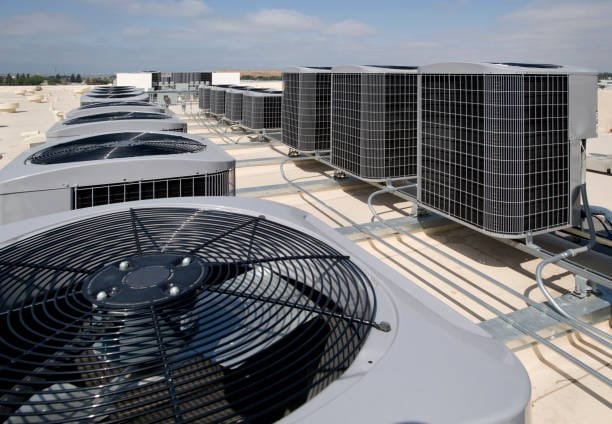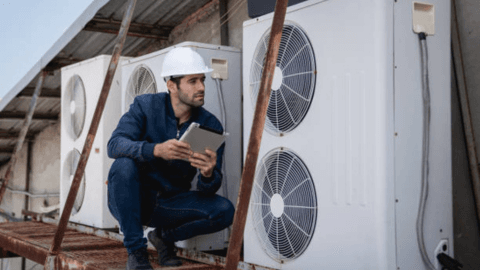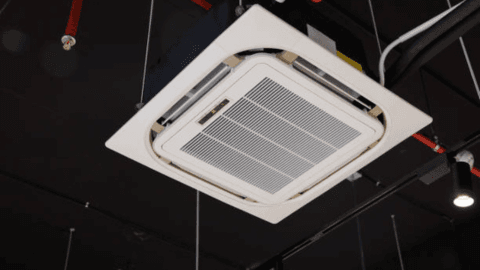
COMMERCIAL AIR CONDITIONING SYSTEM
What Is an Air Conditioner?
An air conditioner is a system that regulates indoor temperature, humidity, and air quality. Commercial units are built to endure harsh weather conditions, ensuring workplaces and commercial interiors remain comfortable and conducive to productivity. They are often installed on rooftops, saving indoor space and minimizing noise disturbances.
Commercial Air Conditioning
A commercial air conditioning system is designed to cool large spaces like offices, hotels, malls, and other commercial buildings efficiently. Unlike residential units, commercial systems are often installed outside or on rooftops, sending cooled air through ducts or vents to different rooms. This setup saves interior space and ensures optimal cooling for larger areas.
How Do Commercial Air Conditioners Work?
The compressor increases the pressure and temperature of the refrigerant.
The refrigerant vapor is cooled by the condenser, turning it into liquid.
The expansion valve lowers the pressure of the refrigerant, making it cold.
The cooled refrigerant absorbs heat from the indoor air, delivering cool air into the building
What Is Considered a Commercial Air Conditioner?
Commercial air conditioners are often larger, more robust units than residential ones. They are usually packaged systems installed on rooftops, combining heating and cooling in a single unit. This design saves space, reduces noise, and provides efficient cooling for expansive areas.
Factors Affecting Commercial Air Conditioning Performance
- Cooling Area: Larger areas require more powerful systems.
- Unit Location: Placement affects cooling efficiency.
- Heat Load: The heat generated by occupants, equipment, and sunlight impacts performance.
- Maintenance: Poor upkeep can decrease efficiency over time.
What Is the Most Efficient Way to Run a Commercial Air Conditioner?
For maximum efficiency, it’s best to let the system run at full speed during cooling. Frequent stops and starts consume more energy than continuous operation at a consistent pace. Regular maintenance and optimal thermostat settings also enhance efficiency.


How Do Cassette Air Conditioners Work?
Cassette air conditioners are mounted on ceilings, unlike wall-hung units. The indoor unit sits flush with the ceiling, dispersing air through two, three, or four sides, ensuring even cooling across a space. This design is ideal for maintaining aesthetics in commercial interiors.
Benefits of Commercial Air Conditioning

Enhanced Security
Closed doors and windows increase safety while cooling the building.

Improved Air Quality
Filters remove allergens, dust, and insects, creating a healthier environment.

Comfort for Exercise
A cool indoor environment encourages physical activity and productivity.

Durability
Designed to withstand weather extremes, commercial units are robust and long-lasting.
Applications of Commercial Air Conditioning Systems
Office Buildings
Hotels and Hospitality
Retail Spaces and Shopping Malls
Restaurants and Cafés
Healthcare Facilities
Educational Institutions
Industrial and Manufacturing Units
Event Spaces and Convention Centers
Theaters and Cinemas
Data Centers and IT Facilities
Fitness Centers and Gyms
Transportation Hubs
Luxury Residences
Office Buildings
Frequently Asked Questions?
1. What types of commercial air conditioning systems are available?
- Rooftop Units (RTUs): Common for office buildings and malls.
- Split Systems: Separate indoor and outdoor units for flexible installation.
- VRF/VRV Systems: Highly efficient systems offering zoned temperature control.
- Chillers: Suitable for large-scale cooling requirements like factories
2.How do I choose the right commercial air conditioning system?
Consider factors like the size of the building, cooling load requirements, energy efficiency ratings, and the number of zones needed. Consulting with HVAC professionals is essential to ensure the best fit for your needs.
3. What is the lifespan of a commercial air conditioning system?
Typically, a well-maintained commercial air conditioning system can last between 15 to 20 years. Regular servicing can extend its lifespan.
4. Can commercial air conditioners also provide heating?
Yes, many commercial air conditioning systems are equipped with heat pumps or heating functions, making them suitable for year-round use.
5. What is the cost of installing a commercial air conditioning system?
The cost depends on the system type, building size, installation complexity, and additional features. A professional HVAC assessment can provide a detailed estimate.
6. How do I know if my commercial AC system needs replacement?
If your system frequently breaks down, consumes excessive energy, or struggles to maintain consistent cooling, it may be time to replace it.
